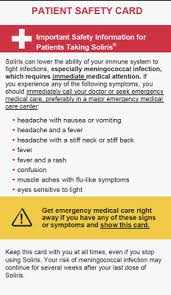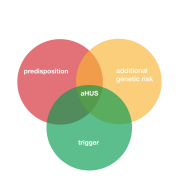For aHUS patients stopping eculizumab (or even Ravulizumab) treatment is an important but emotive issue. Having had the treatment when seriously ill and then recovered, no one wants to go through all that again. That is reasonable and understandable no one wants to be harmed any further.
Of course for those who get access to treatment too late to preserve their kidney function, and there are still too many who do not get treatment when it is needed, there is no point in continuing treatment unless their TMA is continuous. But if the signs of TMA have disappeared many aHUS dialysis patients will go into a remission which possibly will only be broken if and when they get a kidney transplant. Obviously those who have been wrongly diagnosed with aHUS should stop treatment as there will be no benefit in continuing.
For others on treatment the choice of stopping treatment is a challenging and difficult decision. No argument there. Gone are the days when a complement inhibitor treatment was recommended for life. Too much evidence is now available to show that treatment is not needed for life for some patients.
The question now is who can or cannot stop treatment.
But also given the anxiety created by a stopping decision, a further important question is how can stopping be done safely to limit or eliminate any harm.
Stopping Eculizumab Treatment Safely (SETS) has been a clinical trial that emerged from the decision by the UK health policy group NICE to recommend eculizumab for the treatment of aHUS. NICE qualified its decision by saying there should be a study of a safe withdrawal from treatment. That was 8 years ago.
This month the last patients recruited to that study will complete their two years post withdrawal monitoring. Depending on recruitment timing it was always likely that it would take up to four years to monitor all patients entering the trial. But a pause in recruitment because of COVID extended the evidence gathering stage of the study.
This study has been patient centric from the outset and involved a patient advocacy that emphasised patient safety and which was embedded in the study design and protocols ( see previous website article at this LINK) .
Although the clinical outcomes were the paramount end points, and who did or did not relapse and why an important finding; the study looked at how stopping treatment was done and was it done safely and addressed patients’ concerns?
Once the last patients’ complete their two years of follow up, the data gathered will be locked and then the analysis stage of the study begins.
There is lot of data to be analysed not just did patients relapse or not but also what was it about them that permits drawing relevant inferences which could have predicted what would happen which could be applied to others.
However there is more than that because this study will also gather information from each patient in an end of study interview about their experience and feelings of going through stopping treatment. This will include the stopping decision making process , self monitoring process , and the return to care pathway. The patients views captured will be of help in informing others facing a stopping treatment decision
As well as that, there has been a health economics study going on comparing a control group who have not withdrawn from treatment with those who have stopped treatment. That has also not been done before and could add knowledge to the wider economic impact on patents of aHUS treatment.
So the data analysis begins later this month and will take some time to complete and the results will be reported in 2024 in published articles covering the quantitive and qualitative aspects of Stopping Eculizumab Treatment Safely.
Article No.611


